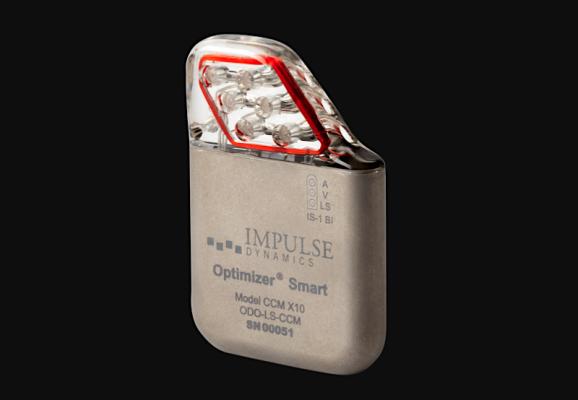
October 27, 2021 — Impulse Dynamics announced the U.S. Food and Drug Administration approved a modification of labeling for the Optimizer Smart medical device, allowing the removal of “normal sinus rhythm” (NSR) from the indications for use statement. Since heart failure patients are no longer required to be in NSR at the time of Optimizer implant, heart rhythm does not impose any restrictions on patients eligible for Optimizer implant, thereby vastly increasing the number of patients who can be treated with CCM therapy.
“We applaud the FDA’s decision based on clinical evidence provided to remove the previous barrier to CCM therapy concerned with heart rhythm, opening it up to additional patients in need,” said Jason Spees, president and chief commercial officer of Impulse Dynamics. “This decision removes what had been a significant barrier for efficient and effective clinical decision making in the best interest of hundreds of thousands of patients.” Impulse Dynamics estimates the current addressable market for CCM therapy in the U.S. alone to be over 1.1 million patients.[1]
Since introducing the two-lead configuration of the Optimizer Smart in 2019, the device’s design has been capable of supporting patients with heart rhythms other than NSR; however, the inclusion of such patients has been prohibited by the approved labeling in the U.S. until today. In the EU, patients not in NSR, including those with atrial fibrillation (A-fib), have been widely treated with CCM therapy with excellent outcomes since 2016.
Additionally, the FDA’s decision was based on the submission of data from a long-term clinical study led by Dr. Jürgen Kuschyk in 2021.[2] The study, comprised of a registry featuring 503 patients in the EU, compared the outcomes of those with A-fib treated with CCM therapy to a cohort treated with CCM that did not have A-fib. Both groups exhibited positive results, and no safety issues related to heart rhythm were identified. Today’s announcement of FDA approval of a simple modification of the labeling to remove “NSR” from the Optimizer’s indications for use has significantly expanded the market for CCM therapy to patients with many different heart rhythms, including A-fib.
“CCM is an important therapeutic option appropriate for patients who manifest lifestyle limiting symptoms despite guideline-directed medical therapy (GDMT) for congestive heart failure (CHF)," said George Mark, M.D., FACC, a clinical cardiac electrophysiologist with The Heart House in Marlton, N.J. "Many of these same patients also suffer from atrial arrhythmias like atrial fibrillation and flutter, which has, up until now, prevented the timely use of CCM. Access to CCM therapy would often be delayed to assess atrial fibrillation burden further, provide opportunities to restore sinus rhythm or titrate medication. Previously, the presence of A-fib presented, at the very least, a mental barrier for clinicians and sometimes eliminated CCM from consideration. This welcomed change to the labeling will simplify the process of assessing suitable candidates for CCM therapy, and for many, will shorten the amount of time required to receive treatment.”
References:
1. This estimate is based on the current CCM therapy indications, which include patients diagnosed with NYHA Class III HF, who remain symptomatic despite guideline-directed medical therapy, and who are not indicated for cardiac resynchronization therapy.


 February 03, 2026
February 03, 2026 









